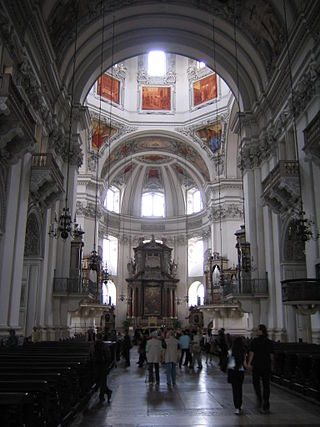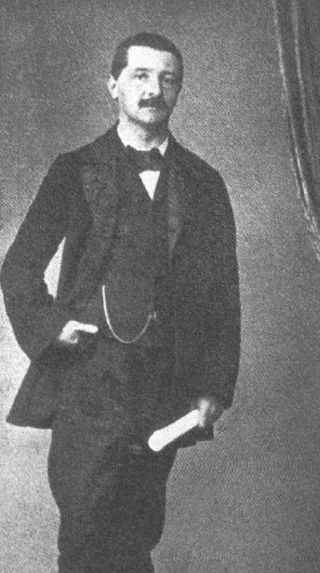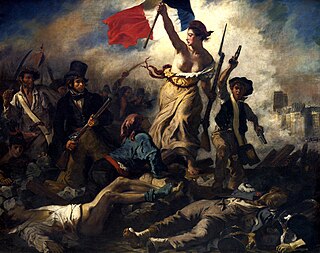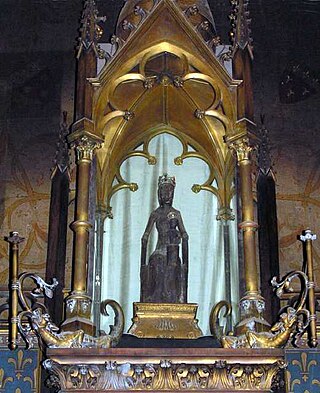Related Research Articles

The Mass is a form of sacred musical composition that sets the invariable portions of the Christian Eucharistic liturgy, known as the Mass.

Missa brevis usually refers to a mass composition that is short because part of the text of the Mass ordinary that is usually set to music in a full mass is left out, or because its execution time is relatively short.
Stabat Mater, FP 148, is a musical setting of the Stabat Mater sequence composed by Francis Poulenc in 1950.

The Credo Mass in C major, K. 257, is a mass composed by Wolfgang Amadeus Mozart in 1776. It is scored for SATB soloists, SATB choir, violin I and II, 2 oboes, 2 clarini, 3 trombones colla parte and basso continuo.

The Missa brevis No. 7 in C major, K. 258, is a mass composed by Wolfgang Amadeus Mozart in 1776. It is scored for SATB soloists, SATB choir, violin I and II, 2 oboes, 2 clarini, 3 trombones colla parte, timpani and basso continuo.

The Windhaager Messe, WAB 25, is a missa brevis composed by Anton Bruckner in 1842.

The Kronstorfer Messe, WAB 146, is a missa brevis composed by Anton Bruckner in 1843-1844.

The Messe für den Gründonnerstag, WAB 9, is a missa brevis composed by Anton Bruckner in 1844.

Les Animaux modèles, FP 111, is a ballet dating from 1940 to 1942 with music by Francis Poulenc. It was the third and final ballet that he composed and was staged at the Paris Opéra in 1942, with choreography by Serge Lifar, who also danced in the 1942 premiere. The themes of the ballet are drawn from the Fables of Jean de La Fontaine.
Quatre motets pour un temps de pénitence, FP 97, are four sacred motets composed by Francis Poulenc in 1938–39. He wrote them on Latin texts for penitence, scored for four unaccompanied voices.

Figure humaine, FP 120, by Francis Poulenc is a cantata for double mixed choir of 12 voices composed in 1943 on texts by Paul Éluard including "'Liberté". Written during the Nazi occupation of France, it was premiered in London in English by the BBC in 1945. It was first performed in French in 1946 in Brussels, then in Paris on 22 May 1947. The work was published by Éditions Salabert. Cherished as the summit of the composer's work and a masterpiece by musical critics, the cantata is a hymn to Liberté, victorious over tyranny.

Sécheresses (Drought), FP 90, is a cantata by Francis Poulenc for mixed choir (SATB) composed in 1937 on poems by Edward James who commissioned it. It was regarded as a failure when it was premiered in 1938, but a great success when it was performed again in 1953.
Sept répons des ténèbres, FP 181, is a piece of sacred music composed by Francis Poulenc in 1961. He wrote the work in seven movements on Latin texts from the Responsories for the Holy Week and scored it for soprano, choir, and orchestra. Written on a commission from the New York Philharmonic, it was first performed in New York's Lincoln Center in April 1963 after the composer's death.

Litanies à la Vierge noire, FP 82, is a piece of sacred music composed by Francis Poulenc in 1936 for a three-part choir of women and organ, setting a French litany recited at the pilgrimage site Rocamadour which the composer visited. The subtitle, Notre-Dame de Rocamadour, refers to the venerated black sculpture of Mary. The composition is Poulenc's first piece of sacred music. In 1947 he wrote a version for voices accompanied by string orchestra and timpani.
Quatre petites prières de saint François d'Assise, FP 142 is a sacred choral work by Francis Poulenc for a cappella men's chorus, composed in 1948. Written on a request by Poulenc's relative who was a Franciscan friar, the work was premiered by the monks of Champfleury.
Michel Piquemal is a French choir conductor and conductor. He is also an operatic singer (baritone).

The Messe solennelle in C-sharp minor, Op. 16, is a mass by the French composer Louis Vierne. He composed it in 1899, scored for choir and two organs. It was published in 1900, before it was first performed at Saint-Sulpice in Paris in December 1901. Although scored for two pipe organs, it was later adapted for a single organ, as most churches could not provide two such instruments.
Ernest Bourmauck was a French choir leader and conductor. Very little is known about him except that he worked closely with Gabriel Fauré, particularly premiering the French composer's Requiem and Francis Poulenc's Mass in G major.
References
- 1 2 Schmidt 1995, p. 270.
- 1 2 Lace 2000.
- ↑ Francis Poulenc by Hervé Lacombe (2013) , p. 1947, at Google Books
- ↑ OCLC 45871602